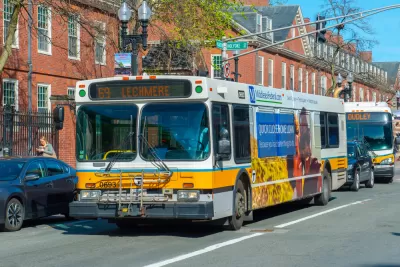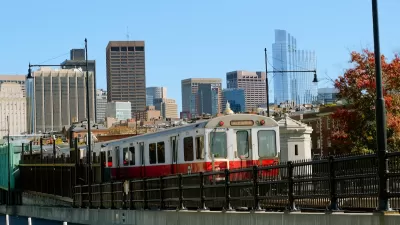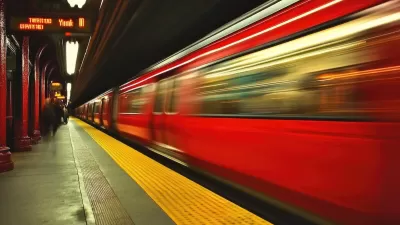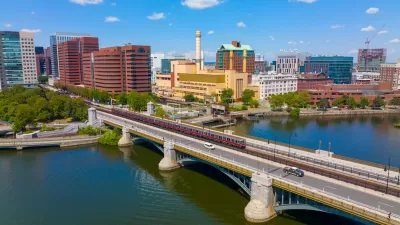With garage construction behind schedule and over budget, it appears doubtful that the MBTA will be able to convert its fleet to electric buses by its self-imposed deadlines.

The Massachusetts Bay Transportation Authority (MBTA) announced it will likely not meet its self-imposed deadlines for switching its bus fleet to all-electric vehicles, reports Yvonne Abraham in The Boston Globe.
“If the T is going to meet its self-imposed goal, as part of its bus electrification plan published last year, its first three rebuilt garages will have to operate at full capacity by 2028, storing around 355 new battery electric buses. But all three of those projects are already behind schedule,” Abraham explains. Beyond that, the agency must build or retrofit six additional garages by 2040, when a state law dictates that all buses must be zero-emission.
Meanwhile, the MBTA “has struggled to maintain even its most basic service” as it faces steep budget shortfalls, equipment issues, and staffing shortages. Advocates of electrification point out that the new garages are also part of the system’s planned bus network redesign, which is expected to increase service by 25 percent.
Executive director of the MBTA Advisory Board says the agency should create a ‘bus facility czar’ to lead the effort. See the source article for more details on the proposed timelines and delays on building the MBTA garages and purchasing electric buses.
FULL STORY: More bus garage delays and blown budgets put T fleet electrification goal in doubt

Study: Maui’s Plan to Convert Vacation Rentals to Long-Term Housing Could Cause Nearly $1 Billion Economic Loss
The plan would reduce visitor accommodation by 25,% resulting in 1,900 jobs lost.

North Texas Transit Leaders Tout Benefits of TOD for Growing Region
At a summit focused on transit-oriented development, policymakers discussed how North Texas’ expanded light rail system can serve as a tool for economic growth.

Why Should We Subsidize Public Transportation?
Many public transit agencies face financial stress due to rising costs, declining fare revenue, and declining subsidies. Transit advocates must provide a strong business case for increasing public transit funding.

How to Make US Trains Faster
Changes to boarding platforms and a switch to electric trains could improve U.S. passenger rail service without the added cost of high-speed rail.

Columbia’s Revitalized ‘Loop’ Is a Hub for Local Entrepreneurs
A focus on small businesses is helping a commercial corridor in Columbia, Missouri thrive.

Invasive Insect Threatens Minnesota’s Ash Forests
The Emerald Ash Borer is a rapidly spreading invasive pest threatening Minnesota’s ash trees, and homeowners are encouraged to plant diverse replacement species, avoid moving ash firewood, and monitor for signs of infestation.
Urban Design for Planners 1: Software Tools
This six-course series explores essential urban design concepts using open source software and equips planners with the tools they need to participate fully in the urban design process.
Planning for Universal Design
Learn the tools for implementing Universal Design in planning regulations.
City of Santa Clarita
Ascent Environmental
Institute for Housing and Urban Development Studies (IHS)
City of Grandview
Harvard GSD Executive Education
Toledo-Lucas County Plan Commissions
Salt Lake City
NYU Wagner Graduate School of Public Service





























